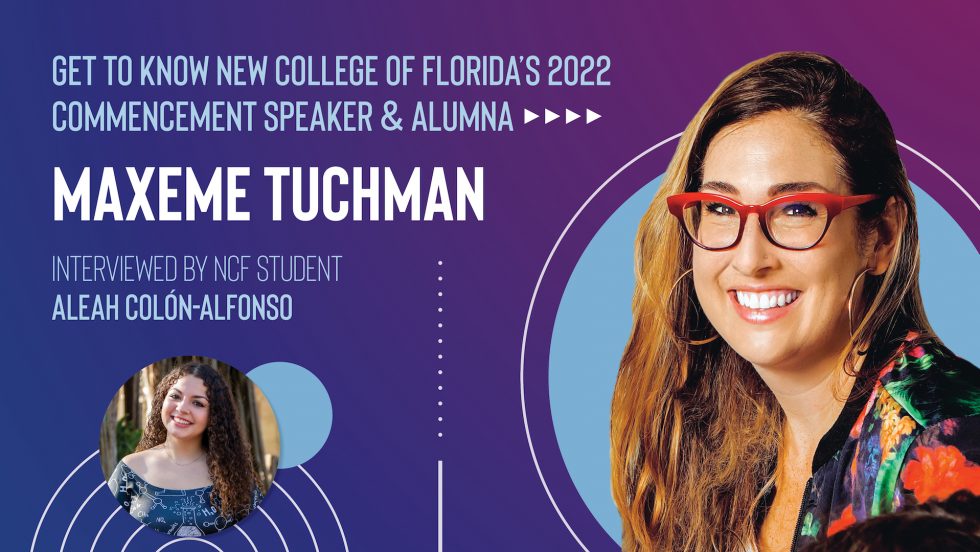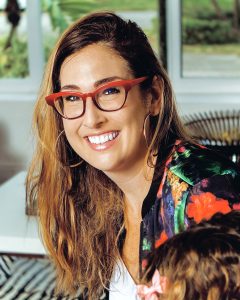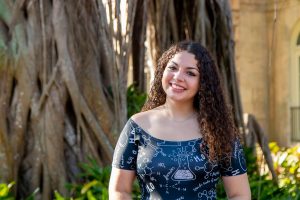A Tale of Two Entrepreneurs: New College of Florida Commencement Speaker Maxeme Tuchman and 2022 Graduate Aleah Colon-Alfonso Talk College, Business and Beyond

Colón-Alfonso and Tuchman have quite a bit in common—as women, as scholars and as entrepreneurs. On April 26 via Zoom, Colón-Alfonso interviewed Tuchman about her work, her passion, and the advice she would give to young people today—about business and life after college.
Read the full interview below and watch the video on YouTube.
Aleah: Hi everyone! My name is Aleah Colón-Alfonso. I’m a biopsychology/neuroscience and theatre, dance and performance studies major at New College of Florida. Today, I’m thrilled to be interviewing New College alumna Maxeme Tuchman—an award-winning entrepreneur who will be speaking at my college graduation in May! Max, would you tell us a little bit about yourself?
Maxeme: Absolutely! I am a New College grad; it’s probably one of the things I’m most proud of. I’m Miami born and raised. I’m an entrepreneur because of many generations of my family that were also technically entrepreneurs. And now I’m the CEO and co-founder of Caribu, and it’s an incredible virtual playdate app where you can read, draw and play games with multigenerational family members (especially kids zero to 12). So, I pretty much get to live the dream every day!
Aleah: Thank you, Max. I can’t wait to hear more about how your experience at New College helped you build your career. But first, what made you choose New College? What was it about the academic program that drew you to the school?
Maxeme: I struggled in high school in the sense that I just never felt challenged. I always kind of felt like one of many people at the school. I felt like I wasn’t getting a rigorous program. No one really cared whether I failed out or stayed or was challenged or was pushed into more academically rigorous programs like AP and other programs. I think the thing that really drew me was the academic rigor of New College. As an honors college, it was incredibly important to me that I would go to a place that would challenge me. I loved the fact that I had an opportunity to build my own kind of schedule and my own kind of path through getting a degree. I feel like a lot of the other schools I applied to said, “You have to take these types of classes and that’s how you make this degree.” And I think New College gives you a lot of independence and a lot of freedom to create a course and a path to what you think that skillset should be for your future.
Aleah: Excellent. Now I’d love to know more about your background. From what I’ve read about you, we have a lot in common! We’re both granddaughters of immigrants. Your family came to America from Cuba, and mine came from the Dominican Republic and Puerto Rico. I believe my family’s trajectory and their pursuits definitely affected my work ethic and the way I am. Could you tell me more about how your upbringing influenced your work ethic?
Maxeme: I’m also the granddaughter of Holocaust survivors, and I think that’s important to talk about because I have studied my family’s history and I’ve seen the sacrifices that my family made to get to this point—from the Ukraine and Russia to Cuba, and from Cuba to Miami. And then, when my mom’s side got to Miami, they didn’t speak the language. Surprise! People in the 1960s didn’t speak Spanish in Miami (no one believes me but it’s true)! And they ended up in Puerto Rico. It was just always about looking for opportunity, always looking for a place where they could make it—just enough so that their kids could make it, so that their kids could achieve more. And I’m incredibly grateful for all the sacrifices that my family made. Because of the sacrifices they made, it fuels me to give back to my community—to give back to communities that look like me, that have been under-resourced, that have immigrated, that have not always had the same opportunities that everyone else has had. And I think I take that with me in the work that I do, no matter where I work.
Aleah: Max, another thing we have in common is that we are both entrepreneurs. I’ve built two companies during my time at New College. And my thesis actually discusses women in business and how they’re treated, and so this conversation actually helps my research a little bit! Can you tell me how your experience at New College prepared you for life as a business owner?
Maxeme: As you know, as a New College student, there is no structured path at New College, and I think that’s what I loved about it. As a business owner and as a tech entrepreneur, there is no structured path. And I think, sometimes, we do a detriment by sending kids to educational programs that are structured paths because nothing in life is structured that way. I had to build my own contract and be pass or fail and add classes to my contract to push myself to try new things, to learn new skills—knowing that I kind of had a little bit of wiggle room in creating my own classes. I created a class about, I think, the Cuban Revolution (in Spanish), because I thought that was interesting and I thought that would help in my international studies degree. I think the freedom and the independence that New College gives you is a skill that is invaluable in life in general.
Aleah: You have said that New College is a great place for entrepreneurs because of what you just said: the academic rigor and the fact that our program encourages students to take risks and be self-reliant. I know you just touched upon it, but would you mind talking a little bit more about that?
Maxeme: I think the other thing is—and your background is reminding me of this—is you have to be able to do hard work with lots of distractions. I feel like taking classes in that building [College Hall] and just looking out at the bay was incredibly hard. And I probably perfected the skill of multitasking—kind of like paying attention to the dolphins but also paying attention to the professors—and also, again, the ability to get really hard work done in such beautiful settings.
Aleah: What advice or success tips would you give to students at New College who will be entering a super competitive work environment after they graduate?
Maxeme: I have lots of advice and tips but you will have to wait for my graduation speech to hear them!
Aleah: OK. So, what does it mean to you to be a role model—not just for women, but for Latina women who are also business owners (women like me)?
Maxeme: I don’t really think of myself as a role model but I think of myself as an example—one data point, one statistic of someone achieving something where you haven’t seen an example of that before. I love the example, I think it was in the 1980s, where Iceland elected their first female president—and there was a story about a kindergarten class where all the boys were drawing female presidents as kind of like their pictures, and the teacher goes around and says, “Well, what do you want to be when you grow up?” and they were like, “Oh, well I can’t be president because that’s a woman’s job.” Just again, the ability to see something and be able to imagine yourself there…And if you don’t see examples that look like you (and I say that with gender, sex, racial, ethnic, ability, all the things that make us us), when you don’t see examples of you in a role that you want to be in in the future, it’s sometimes hard to imagine that there’s a space for that or that people want you there or that you have a path to that (it could be a career or it could be a personal thing that you’d like to be). And the statistics in venture capital are terrible. Less than two percent of venture capital dollars go to women and people of color and so, you know, if I can be an example for a woman, a person of color, even a Latina like me with white privilege, if someone can look at that and say, “Huh, she was able to access some of that two percent. And if she can do it, I could probably do it too, and maybe I could do it better,” that makes me happy.
Aleah: If you could go back and visit yourself at my age and tell yourself one thing about how you would approach the future, what would it be?
Maxeme: That nothing gets easier (laughs). I think I had this idea that, at a certain age, things would get easier—at a certain point in my career, things would get easier. And even running a startup…I mean, you know, being a business owner, you think, oh, at a certain revenue milestone, things will be easier…or like, when I have one employee, it will be easier…and no! I think the advice I would give myself would be it doesn’t get easier; it’s just a different type of hard. And be flexible. Be prepared for that. And don’t get so crushed when it doesn’t become easier. Just recognize that it’s a new thing that you’re going to get to struggle with, and that it’s just a different type of hard, and it’s going to be awesome to struggle with it.
Aleah: That’s excellent. Thank you. Those are all the questions I have for you. Thank you so much for taking the time to talk with me and I cannot wait to hear you speak at commencement this May!
About Maxeme Tuchman:

Maxeme Tuchman graduated from New College of Florida in 2004 with a bachelor’s degree in political science and international studies.
Today, she is the co-founder and CEO of the Miami-based tech company, Caribu—a digital calling platform, often described as “FaceTime meets Kindle,” which enables children to have virtual playdates with family members when they cannot be physically together.
A graduate of Design and Architecture Senior High School in Miami, Tuchman set out to be the first in her family to attend college. She always knew she would find a way to incorporate her passion for educating young people into her post-graduate work. And youth education has been a key component of Caribu, which has grown exponentially during the pandemic and was even named a “Best of 2020” app by Apple.
Tuchman’s undergraduate thesis research at New College laid some of the groundwork for her current venture, as it was focused on education as a tool for social justice. But it wasn’t just research and writing at New College that gave Tuchman insight into how to lead and inspire.
She served as president of the New College Student Alliance (student government); and was a co-founder of La Esquina Latina (“The Latin Corner”), a student-designed living arrangement in the Dort and Goldstein Residence Halls. La Esquina Latina allowed female Spanish-speaking students to room together and immerse themselves in their culture while attending college. Through many extracurricular methods, Tuchman found a way to make sure her classmates always had a voice.
Tuchman also learned autonomy and independence at New College through the contract system (evaluations rather than traditional grades) and Independent Study Projects (ISPs).
“The thing that New College teaches you is to really advocate for yourself, to think about your college career with a holistic approach, and to take risks,” Tuchman said. “I wouldn’t have had that agency elsewhere. I wouldn’t have taken as much ownership of my education elsewhere.”
Since graduating from New College, Tuchman has worked in nearly every level of education—as a public school teacher, a consultant at the Bill & Melinda Gates Foundation, an executive director of Teach For America, and a manager of education projects under former Mayor of New York City Michael Bloomberg and Chancellor of D.C. Public Schools Michelle Rhee.
Tuchman holds a master’s degree in public policy from the Harvard Kennedy School and a second master’s degree in business administration from Harvard Business School. She is a graduate of the Coro Fellowship in Public Affairs and the Miami Fellows program.
Before co-founding Caribu, Tuchman was appointed by former President Barack Obama to serve as a White House Fellow at the United States Department of the Treasury. During the 2015-2016 year, she worked as a strategic policy adviser, providing guidance and planning on financial inclusion initiatives (only about 16 aspiring leaders are appointed as White House Fellows annually).
As a businessperson, Tuchman has been a winner or finalist in more than 30 pitch competitions, is the 59th Latina in the United States to raise more than $1 million in venture funding, and is the first Latinx founder (male or female) to raise $1 million in equity crowdfunding. She was even named one of Inc. Magazine’s “Top 100 Female Founders” in 2019.
Caribu made Fast Company’s list of “World-Changing Ideas” in 2019, was one of TIME Magazine’s “Best Inventions 2019,” was singled out as one of the “Top 10 EdTech Companies” in Forbes in 2018, and became one of the most innovative startups in the world by winning the 1776 Global Challenge Cup in 2018.
A granddaughter of immigrants and a daughter of parents who fled Cuba for America, Tuchman is also dedicated to employing individuals from underserved populations. She has helped bring economic growth to Miami by headquartering her company in her hometown.
Change is being made daily under Tuchman’s watch. When she reads testimonials from users of Caribu—grandparents who spent the pandemic years away from their grandchildren, who have found joy in something Tuchman helped create—she knows she is in the right place doing the exact right thing.
In Tuchman’s words: “I’m so proud of what we’ve built from nothing. And I’m so grateful that what we’ve built is changing lives.”
Read more here: ncf.edu/news/tech-trailblazer-alumna-creates-florida-jobs.
About Aleah Colón-Alfonso
 New College thesis student Aleah Colón-Alfonso, an immunocompromised student with an entrepreneurial passion, is designing health-centric products to help people like her thrive.
New College thesis student Aleah Colón-Alfonso, an immunocompromised student with an entrepreneurial passion, is designing health-centric products to help people like her thrive.
During her collegiate studies, she already built two companies: Aleah Wares (a line of patient-friendly sweaters) and Stay Safely Away (wearable merchandise—from T-shirts to masks—that allows customers with immune issues to “stay distantly social” during the pandemic). She began working on the latter company while in quarantine when she evacuated from the New College campus in March 2020.
“I had been noticing the lack of mask wearing and social distancing in Sarasota, and I just wanted to wear a sign around my neck that said, ‘Please, I don’t want to be on a ventilator’ to try to encourage people to have better behaviors,” Colón-Alfonso said. “So, clothing became my wearable sign.”
Colón-Alfonso has small fiber neuropathy, Lyme disease and accompanying secondary illnesses. She received these diagnoses before the age of 18, and was in a wheelchair for much of her senior year in high school in New Jersey.
“I’m no stranger to infusions and long-term treatments. After being diagnosed with neuropathy, I was prescribed weekly immunoglobulin infusions (IVIG) to help heal my nerves,” she said. “The infusions have many side effects similar to chemotherapy, including severe temperature changes, fever, nausea and fatigue.”
Colón-Alfonso’s illnesses may be inconvenient (oftentimes it takes hours for her to get on her feet in the morning) but she does not view them as hindrances. If anything, they make her more of a goal-setter and visionary, as they push her to raise public health awareness and promote social change.
“I don’t let my illnesses stop me from doing anything,” Colón-Alfonso said. “I think that being so sick for so long gives you an extra sort of motivation. It’s a very good distraction to have goals I know I can hit, even when my sickness acts up.”
Stay Safely Away is the manifestation of that. After more than a year of work (including website creation and social media marketing), requests for Colón-Alfonso’s self-designed products began rolling in from across the globe.
“It’s surreal to see my ideas out there. It’s amazing,” Colón-Alfonso said. “Everyone I know is on social media platforms, sharing my ideas.”
And Colón-Alfonso’s ideas are numerous. As a student, she is pursuing a biopsychology/neuroscience area of concentration, along with a focus on theatre, dance and performance studies. She also holds a black belt in taekwondo and is president of the Aikido Club at New College.
Biology Professor Tiffany Doan, Ph.D. is cheering Colón-Alfonso on, both in the classroom and on the mat (Doan is the sensei for the Aikido Club).
“Despite having chronic illnesses, Aleah has persevered through all of her New College classes, often while in pain and unable to walk,” Doan said. “Just like she will not let any illness hold her back, she makes products to encourage people to live their best lives in safety and comfort. I’m very proud of the work she is doing.”
Read more here: ncf.edu/news/student-entrepreneur-builds-two-companies.
For more information about commencement at New College of Florida, visit ncf.edu/ncf-events/commencement.
Abby Weingarten is the senior editor in the Office of Communications & Marketing.
